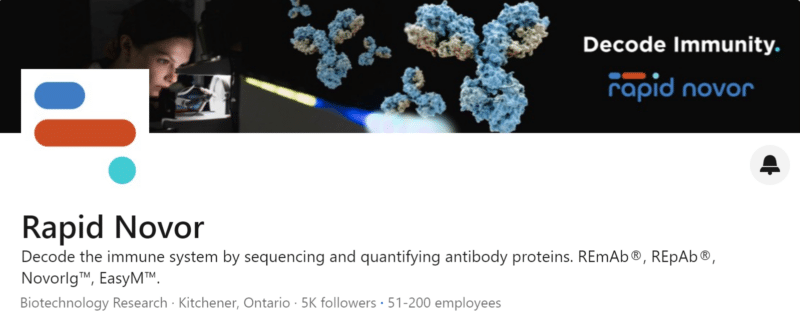
Introduction
Protein sequencing is a method that typically utilizes mass spectrometry (MS) to determine the amino acid code of a protein1. Prior to the development of mass spectrometry, Edman degradation, a method involving the stepwise degradation of peptides to derive the order of amino acids, was the mainstream approach. Nowadays, mass spectrometry is favored due to its ease of use and high throughput capabilities, though Edman degradation is still employed for specific applications in which the technique is well suited.
Protein sequencing is frequently compared with DNA sequencing as both are used for biological identification. However, researchers might opt for protein sequencing over DNA sequencing for several reasons. Firstly, protein sequencing generates significantly fewer random matches against sequence libraries than DNA sequencing. This is because DNA relies on four bases (A, T, C, G). Thereby, two unrelated DNA sequences are expected by chance to have 25% similarity. In contrast, protein sequences can be generated from 20 different amino acids, therefore providing greater sensitivity. In addition, though DNA databases are currently considerably more expansive, they are plagued by a greater number of redundant sequences than protein databases. This means that researchers can expect to encounter fewer random hits with protein sequencing1.
Secondly, while DNA sequencing offers a window into the potential cellular proteins that could be generated, protein sequencing can also provide information on post-translational modifications (PTMs), which are instrumental to the structure and function of a protein1. Therefore, protein sequencing is particularly useful in identifying the actual effectors present in a molecular pathway.
De Novo Sequencing
The objective of de novo protein sequencing is to reconstruct the amino acid sequence of a peptide/protein given a MS spectrum without reliance on previously established databases. This powerful method is key to characterizing proteins, in particular novel protein sequences.
De novo protein sequencing has drawn much attention with regard to antibody sequencing. Antibodies are essential molecules in our immune system and serve as invaluable tools in the fields of diagnostics and therapeutics. Under standard commercial conditions, antibody production begins once an animal is inoculated with a desired antigen. This drives an immune response that involves genetic hypermutation of plasma cells and rearrangement events that create polyclonal antibodies. Using molecular techniques such as hybridoma generation and single B cell sequencing, researchers can then isolate individual clones (monoclonal antibodies) from the mixture.
Critically, immunizing the original animal with an identical antigen will produce differing batches of monoclonal antibodies — each bearing unique specific activities. In this instance, DNA sequencing could be used to identify matching antibodies; however, as it involves extensive bioinformatic analysis and detailed workflows, researchers typically select an alternative approach.
De novo protein sequencing using mass spectroscopy is a more convenient way to determine the monoclonal antibody code, which can then be used for recombinant antibody expression to ensure reproducibility. When used in conjunction with complementary biophysical and biochemical methodologies, this method also allows for elucidation of the structure, avidity and PTMs of antibodies. In addition, an important feature of de novo protein sequencing is that it avoids random or biased sequence introduction from homology-based searching of databases1. For this reason, it is a key tool for the process of antibody validation.
From a practical perspective, de novo protein sequencing is especially useful as it can be used once an antibody-producing cell line has ended, when DNA is unavailable, or when the production animal has died. Accordingly, MS-based de novo protein sequencing is an excellent tool for commercial and non-commercial antibody research and development.
Antibody Sequencing Service
As a world leader in antibody protein sequencing, Rapid Novor has developed the most advanced de novo protein sequencing software2 and mass spectrometry techniques to provide monoclonal and polyclonal antibody sequencing services, as well as antibody expression services. Guaranteeing 100% coverage of the antibody protein sequence from N-terminus to C-terminus, Rapid Novor can generate detailed reports with accurate heavy and light chain antibody sequences from just 0.1 mg of the antibody protein. This gives you confidence in an accurate antibody protein amino acid sequence and ensures that if you recombinantly express the antibody sequences, the antibody will behave in the same way as the original.
References
- Ma, B., and Johnson, R. De novo sequencing and homology searching. Mol. Cell. Proteomics. 11(2):O111.014902 (2012).
- Ma, B. Novor: Real-Time Peptide de Novo Sequencing Software. J. Am. Soc. Mass Spectrom. 26, 1885–1894 (2015).
Talk to Our Scientists.
We Have Sequenced 9000+ Antibodies and We Are Eager to Help You.
Through next generation protein sequencing, Rapid Novor enables reliable discovery and development of novel reagents, diagnostics, and therapeutics. Thanks to our Next Generation Protein Sequencing and antibody discovery services, researchers have furthered thousands of projects, patented antibody therapeutics, and developed the first recombinant polyclonal antibody diagnostics.
Talk to Our Scientists.
We Have Sequenced 9000+ Antibodies and We Are Eager to Help You.
Through next generation protein sequencing, Rapid Novor enables timely and reliable discovery and development of novel reagents, diagnostics, and therapeutics. Thanks to our Next Generation Protein Sequencing and antibody discovery services, researchers have furthered thousands of projects, patented antibody therapeutics, and ran the first recombinant polyclonal antibody diagnostics

